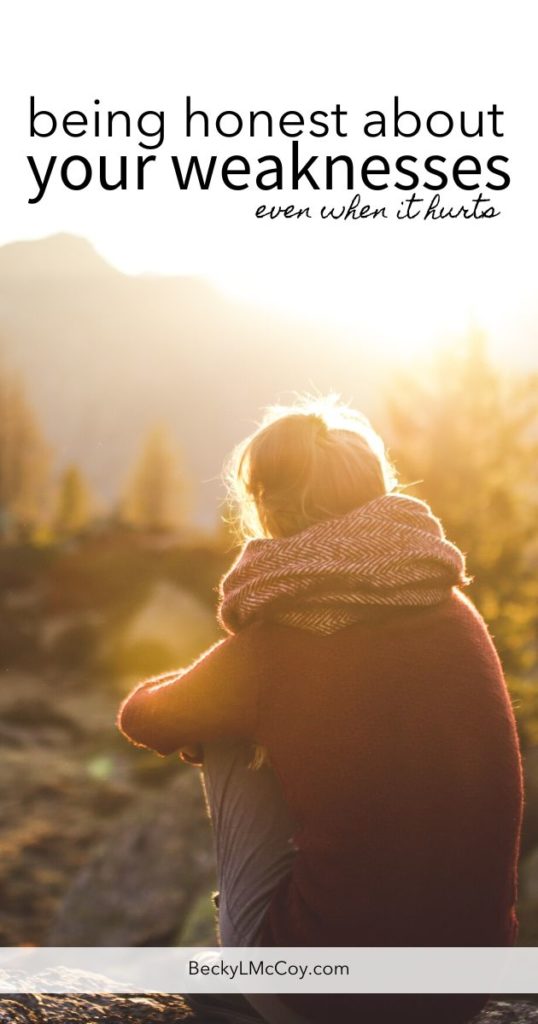Being Honest About Your Weaknesses (Even When It Hurts)

Have you ever worried what would happen if you had to be honest about your imperfections? Do you feel like life is sometimes a Jenga tower, balanced on some of your strengths with each weakness only precariously holding up the blocks above them? Do you acknowledge your weaknesses or do you prefer to pretend like they’re not there? Are you holding your breath, waiting for one stressful, traumatic moment to make it all come tumbling down? What if there was a better way, one where we could be honest about our weaknesses and shore them up instead of just hoping for the best?
Fun fact: “integrity” has always been one of my favorite character traits. When I was in high school I tried really hard to get people to use “integral” as the adjective version of the word instead of always describing people as “having integrity.”
Nerd alert.
I know.
But I think even high school me knew that we weren’t talking about integrity enough.
People often quote C.S. Lewis when defining integrity instead of using a more formal definition: “integrity is doing the right thing, even when no one is watching.” It’s being the same person in private and in public. Someone with integrity has the same personality and character traits regardless of the people they are with or situations they are in.
I dream of a world where integrity is something everyone aspires to.
*Stay focused, Becky.*
I feel like most conversations on character focus on the positives. Being trustworthy, loyal, creative, kind, generous, and gentle are all absolutely lovely things and things. We should absolutely be known as people who practice those things and who are growing to do better each day.
But it’s not the whole picture.
Integrity is not about being the best version of yourself all the time or growing above your weaknesses to only focus on your strengths.
What if we thought about integrity as embracing our wholeness?
I, Becky McCoy, am creative, determined, loyal, safe, and deeply loving. But I am also often disorganized, frenetic, forgetful, and inconsistent. I say that without any guilt or shame (although it is a bit nerve-racking to say that out loud) because I’ve seen magic that happens when I look at myself as a whole being, not just a summation of my positives. Just think: if you made chocolate chip cookies with only chocolate and vanilla but no baking soda or flour, you’d have a gooey mess and probably a smokey oven. Wholeness is important.
Stick with me here. We’re all puzzle pieces within our communities (and I absolutely consider long-distance friends and online groups communities). If we only acknowledge our strengths, we are all puzzle pieces with only bumps. When we are honest about our weaknesses, we develop the hole sides (is there a better way to describe that? Probably, but I think you know what I mean). When we are honest about strengths AND weaknesses, we fit together.
Your strengths help my weaknesses and my strengths can fill in where there’s space because of your weaknesses. When I tell someone “I’m finding it difficult to cope with this,” I’m inviting them to exercise their strengths.
When we embrace the idea that integrity is just as much about our weaknesses as our strengths, we create opportunities to connect with each other. We acknowledge that we need each other and that we can meet each other’s needs. Being honest about what we can do well and what we can’t is like using all the ingredients in that chocolate chip recipe: the individual items come together to make something really wonderful.
Psst…it’s you. You’re the thing that’s really wonderful.
Here are two books that have helped me embrace my wholeness:
– Bandersnatch by Erika Morrison
– Present Over Perfect by Shauna Niequist
Links may be affiliate links, which means when you use them you help support the work I do. Thanks for help keeping the lights on!
Get more encouragement like this straight to your inbox. Sign up below.
Get 4 Mantras For When I'm Overwhelmed
